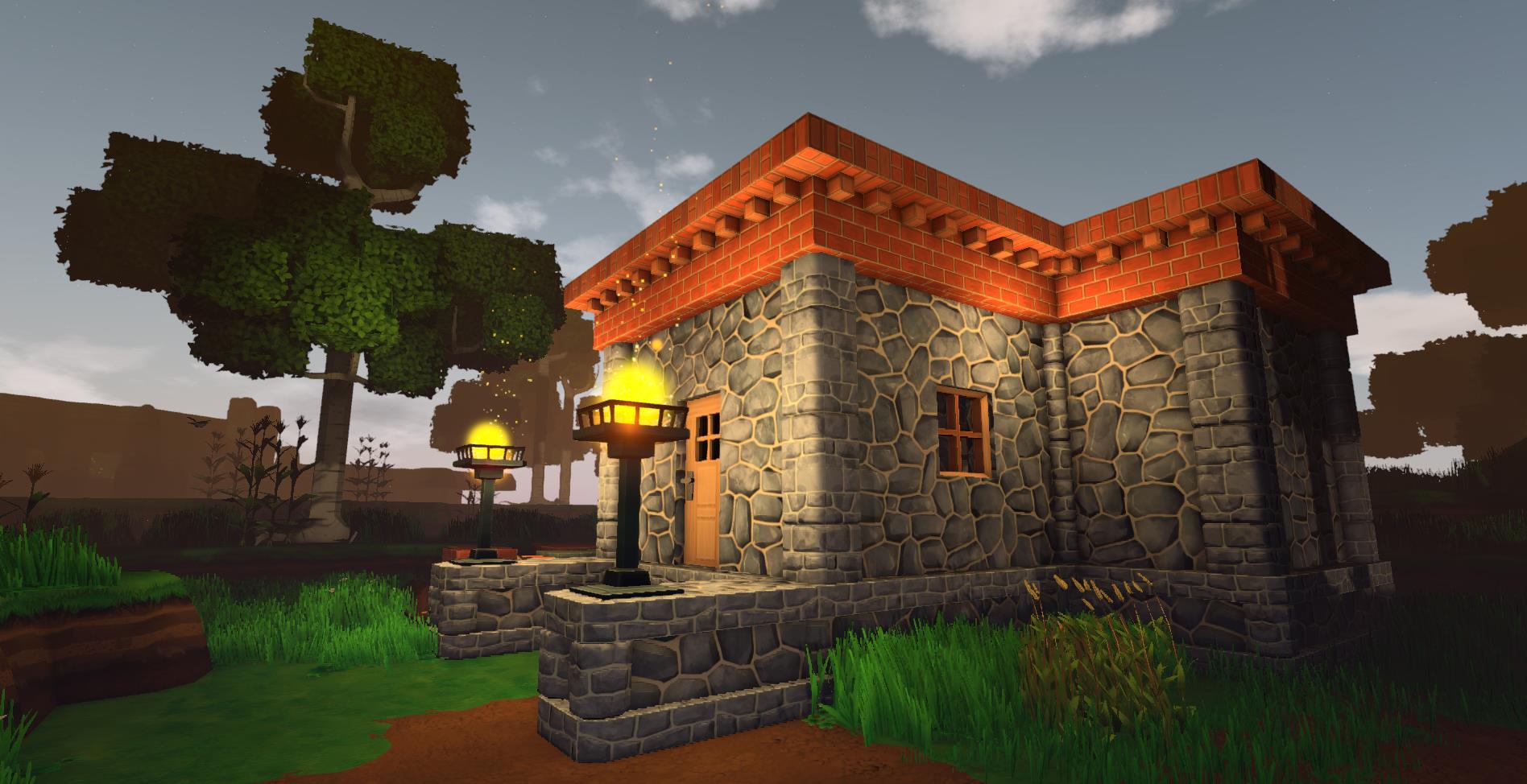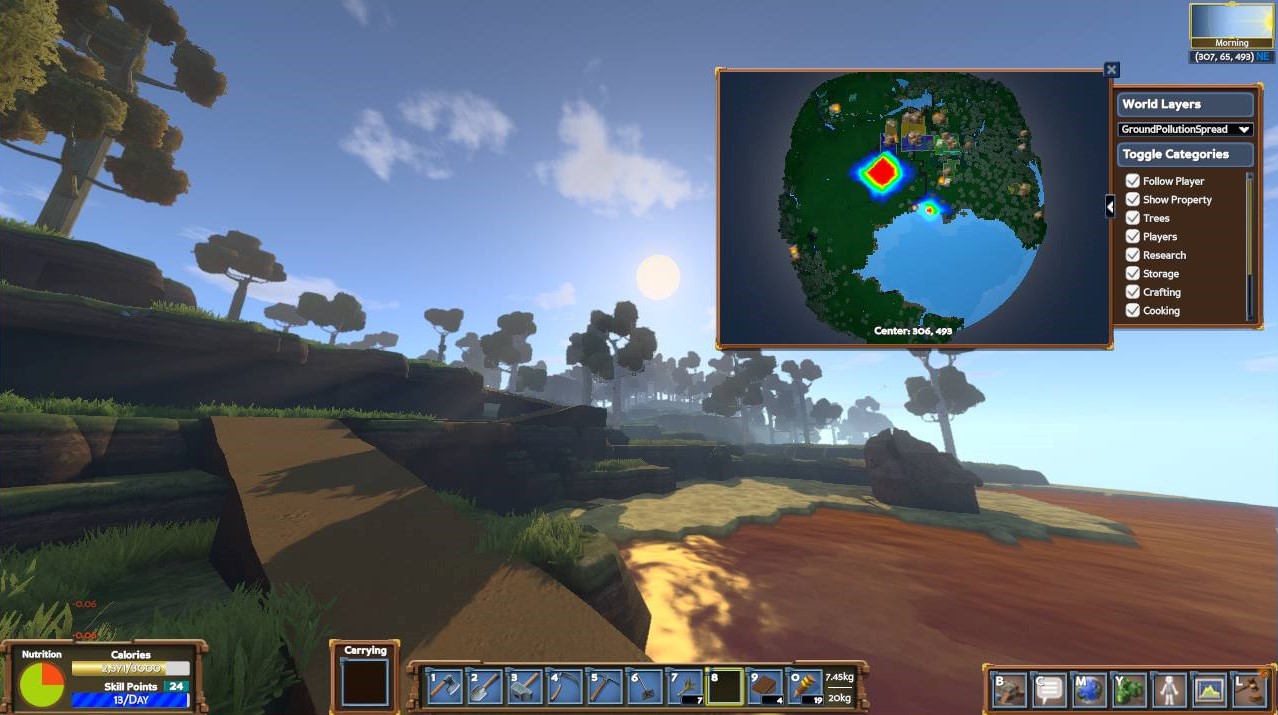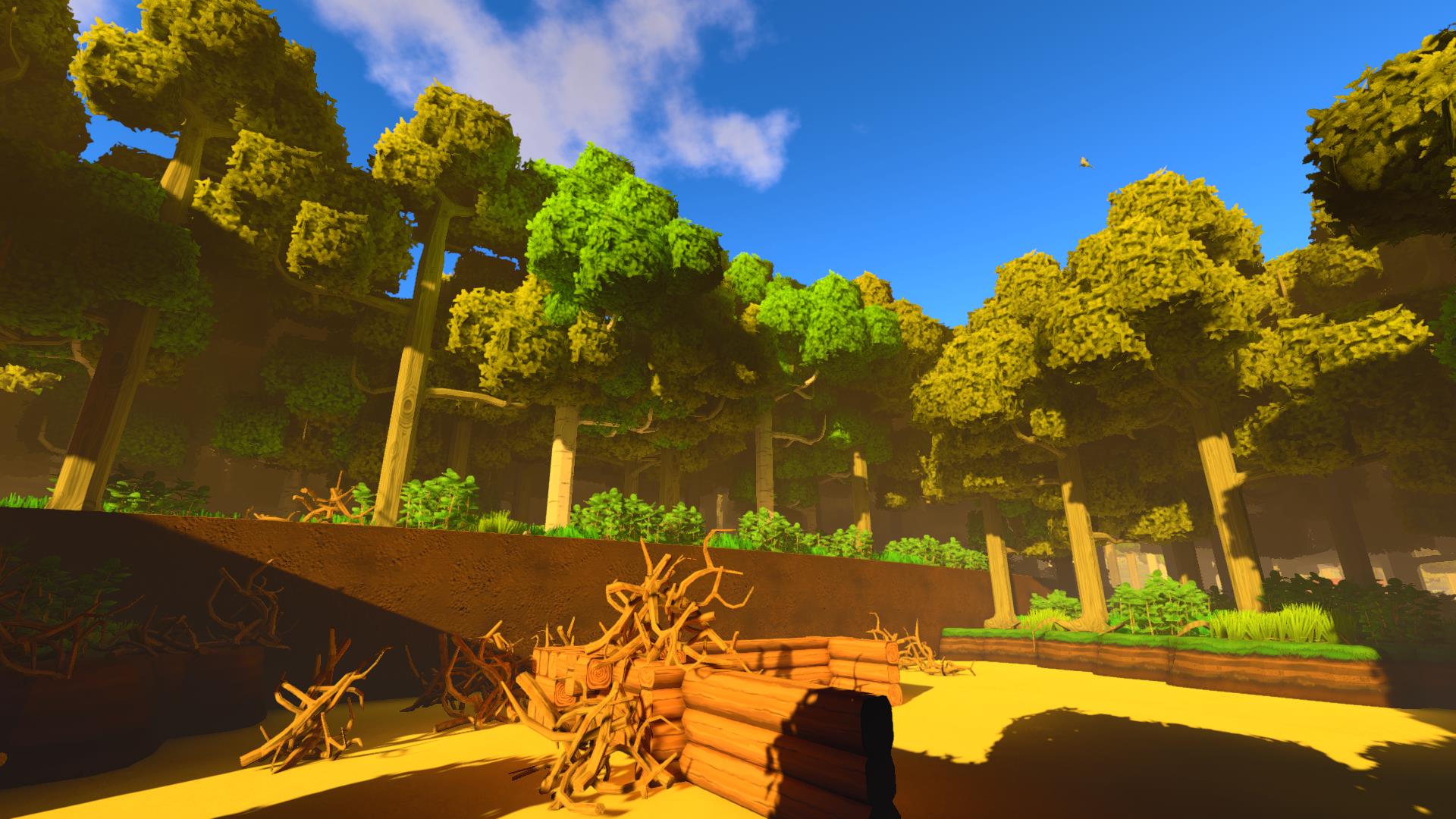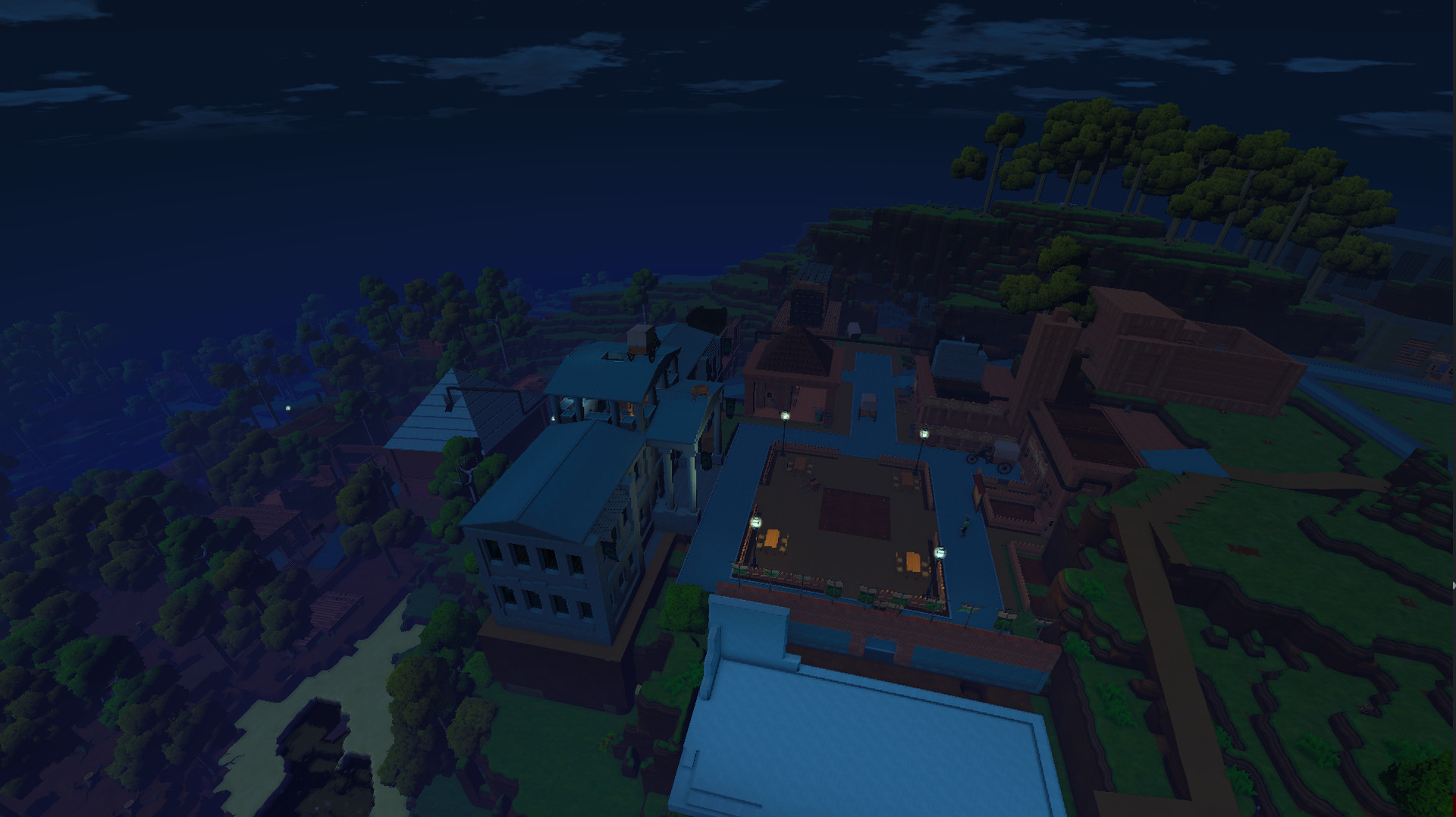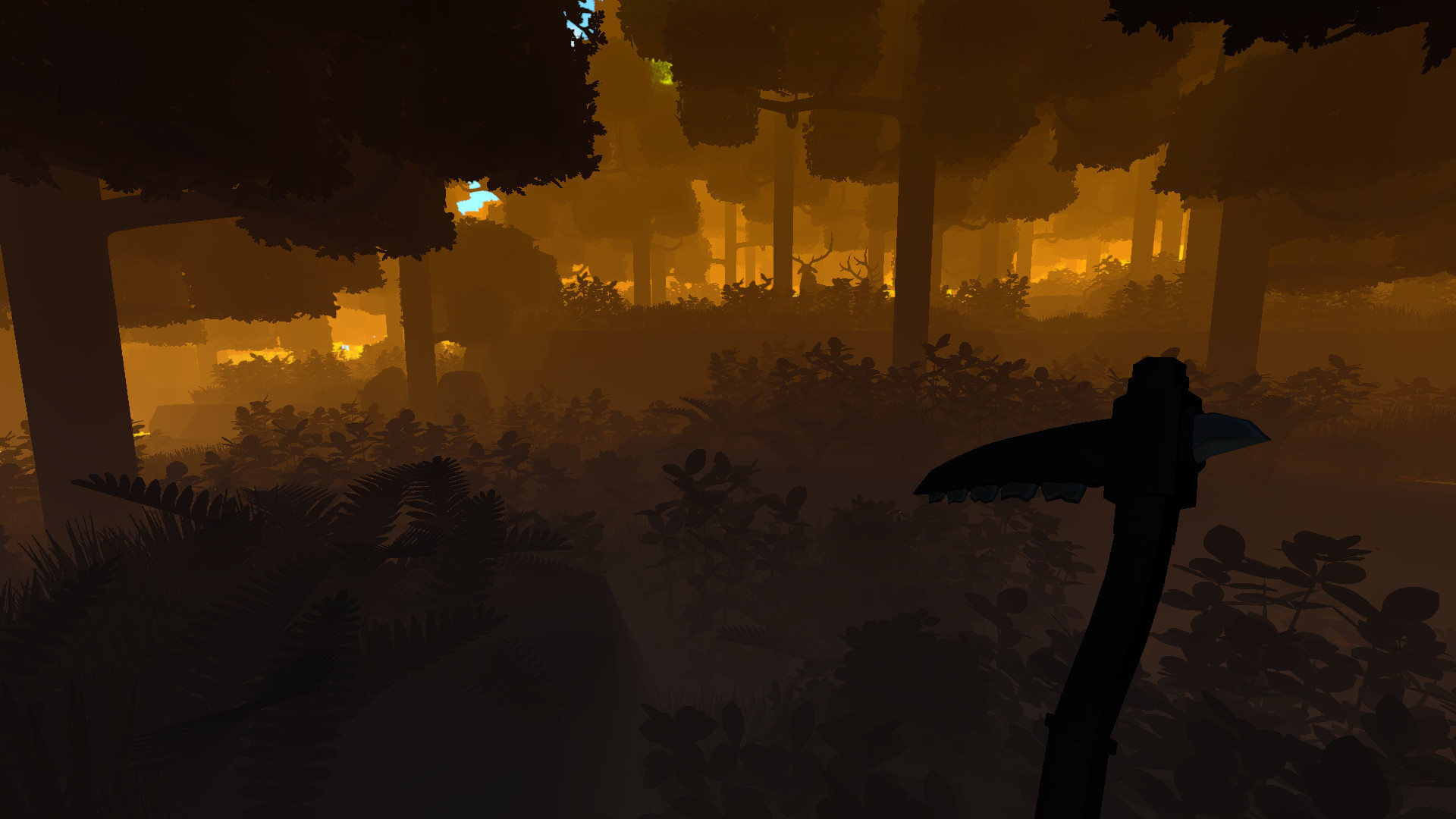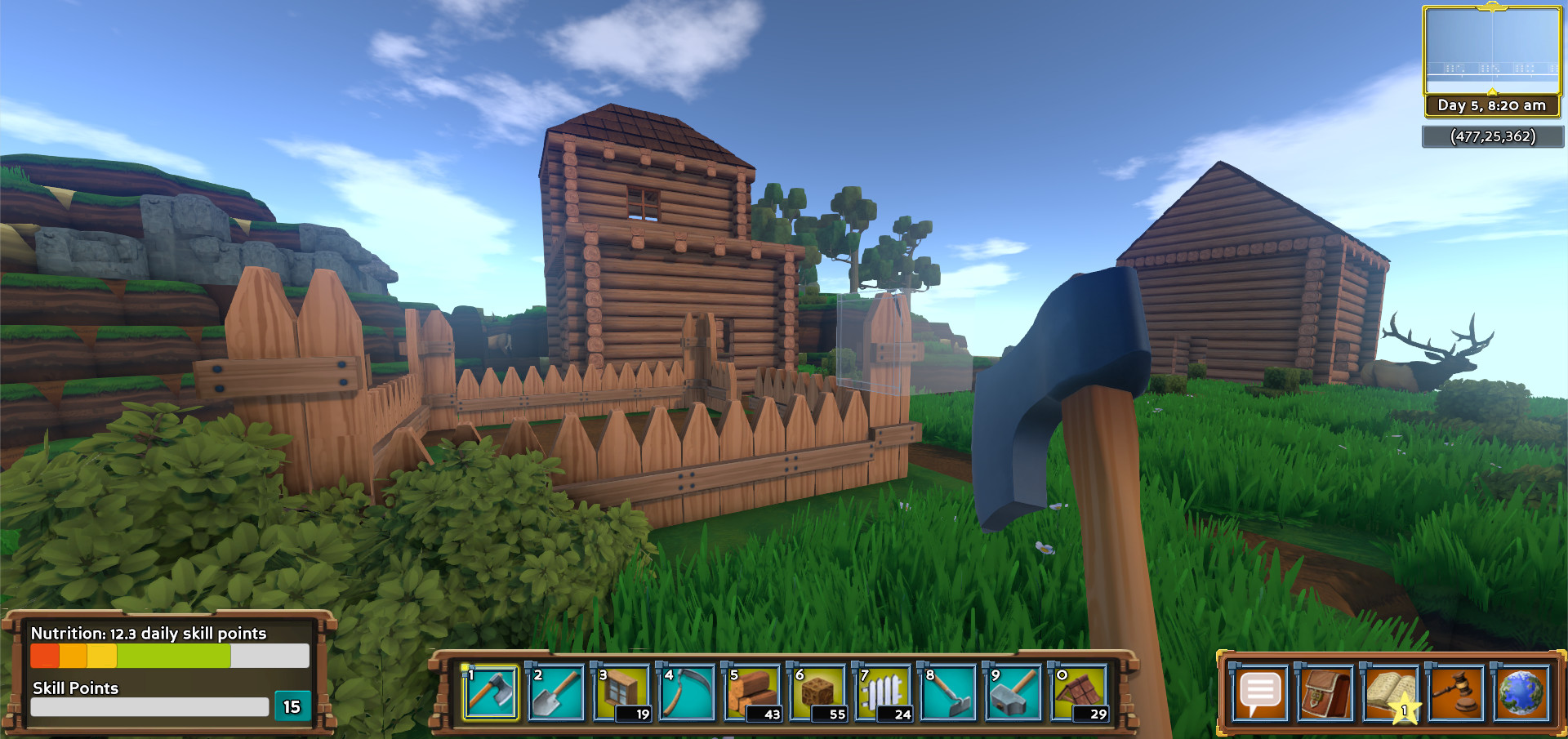Enter the world of Eco, where you must team-up to build civilization and prevent a disaster, using resources from a fully simulated ecosystem, where your every action affects the lives of countless species.
Will you and your fellow builders collaborate successfully, creating laws to guide player actions, finding a balance that takes from the ecosystem without damaging it? Or will the world be destroyed by short-sighted choices that pollute the environment in exchange for immediate resource gains? Or, do players act too slowly, and the world is consumed by a disaster that could have been avoided if you developed the right technology? In Eco, you must find a balance as a group if the world is to survive.
Enter humans into this equation, and things get complicated. It is the role of players to thrive in this environment by using resources from the world to eat, build, discover, learn and invent. However, every resource they take affects the environment it is taken from, and without careful planning and understanding of the ecosystem, lands can become deforested and polluted, habitats destroyed, and species left extinct.
In the extreme, the food supply of the ecosystem can be destroyed, along with all human life on it, resulting in server-wide perma-death. Eco is a game where the player’s actions have meaningful consequences.
Will you and your fellow builders collaborate successfully, creating laws to guide player actions, finding a balance that takes from the ecosystem without damaging it? Or will the world be destroyed by short-sighted choices that pollute the environment in exchange for immediate resource gains? Or, do players act too slowly, and the world is consumed by a disaster that could have been avoided if you developed the right technology? In Eco, you must find a balance as a group if the world is to survive.
A world-survival game
Eco is a survival game in a global sense, where it is not just the individual or group who is threatened, but the world itself. The world of Eco will be home to a population of thousands of simulated plants and animals of dozens of species, each living out their lives on a server running 24 hours a day, growing, feeding and reproducing, with their existence highly dependent on other species.Enter humans into this equation, and things get complicated. It is the role of players to thrive in this environment by using resources from the world to eat, build, discover, learn and invent. However, every resource they take affects the environment it is taken from, and without careful planning and understanding of the ecosystem, lands can become deforested and polluted, habitats destroyed, and species left extinct.
In the extreme, the food supply of the ecosystem can be destroyed, along with all human life on it, resulting in server-wide perma-death. Eco is a game where the player’s actions have meaningful consequences.
- Everything you do affects the ecosystem, and players can destroy their food supply and world (server-wide permadeath)
- Create a player-run government to make decisions as a group, proposing and voting on laws
- Use data gathered from the world to propose and vote on laws as a group. Debate with scientific argumentation.
- Create a player-run economy that allows you to sell not only good but services in the form of server-enforced contracts (simulating a player driven quest system).
- Your food level determines your skill-increase rate, making food very important and tying players directly to the ecosystem from which it comes.
- A game with goals higher than entertainment. We plan to build it for schools as an augmented classroom world students share.
Developer Blog: Districts
New Government system: Constitution
New Government system: Elections and Elected Titles
New Government system: Demographics and Wages New Government system: Laws Part 1: Using the system New Government system: Laws Part 2: Taxes, Ownership, Property, and Wealth New Government system: Laws Part 3: Tour of different actions, and Executive Actions New Government system: Districts (This blog) New Crafting: Work Parties
New Crafting: Labor System New Crafting: Modules and Efficiency Redesign New Crafting: New Tech Tree New Building System: Hammer and new Building Styles New Mining System: Mineral Dispersion and Drill Usage New Mining System: New Processing Path and Pollution Info New Animal System: Attacking Animals New Ecopedia System
New UI New Audio New Hosted Worlds System[/olist]
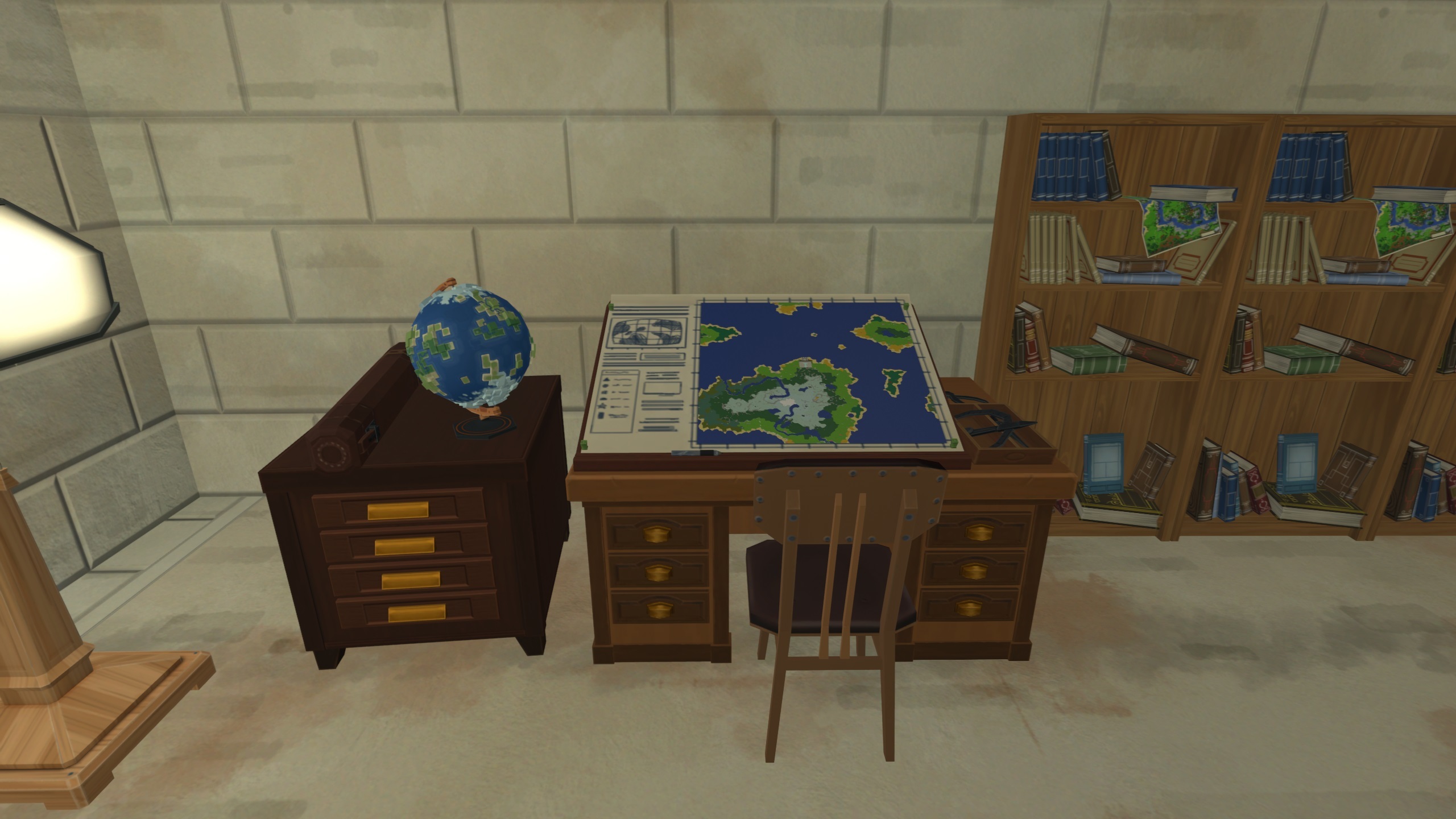
You can now have multiple District Maps, each containing a set of districts defining an area. Each map is totally independent, meaning maps can overlap other maps. In the Zoning Office is this UI:

Each Zoning Office lets you define three maps, and as normal civic objects the Constitution defines who can modify them, what kind of election is required, etc. You can see on this map, the Constitution defines that districts can be changed only by election:

(Check out the Constitution blog for more info on how that works).
In this Zoning Office, there are two district maps active, Protected Areas and Claimable Property, and one under election, Logging Regions. Lets revise the protected areas.

In the editor that appears, you can paint on the different areas of the map, revising any previous map that was already there. You can add and remove districts and make any changes you want. When you submit, it will go to election (if thats what the constitution requires):

This election then occurs like any other election, defined by the election process (check out the Elections blog for details on how that works). Once the election passes, it will apply the changes.

Any law that referenced a previous district will be updated to the new district, automatically propagating the change to anything referencing these districts. You can start to see how all these systems work together; since district maps are a regular civics object (like laws, elected titles, demographics, etc), they automatically get all the features like revisions, error testing, reference updating (when they get modified), tracking of state (draft, proposed, active, removed).
So now lets make use of one of these districts, in a law.

Well go over in detail how laws work in a later blog, but for now you can get an idea how it works. The trigger (hunting a specific species) with restriction (inside a given protection region) will be prevented.
Tons of flexibility is allowed here, say we want to make a special area where only certain citizens can claim land:

Only citizens possessing Title 1 can claim land in this district now. Title 1 could be defined in many ways: it could be an elected position, it could be a title assigned by players, it could be a title gained by completing a work party (see Work Party blog ).
Lots more to come, stay tuned for more Eco 9 updates and the release (on a date to be announced).
- John K, Eco Designer, CEO Strange Loop Games
Hello all, hope youre enjoying your quarantining around the world and getting lots of gaming time in, stay safe and get your socializing in virtually. Our update today is on the new Districts system weve added for Eco 9. Heres the current lineup:[olist]
Districts
The purpose of districts in Eco is to define specific rules for various areas of the map. Weve had this for awhile, but with Eco 9 its getting a big upgrade. To start, districts are now set in-game and are contained in the new Zoning Office object.
You can now have multiple District Maps, each containing a set of districts defining an area. Each map is totally independent, meaning maps can overlap other maps. In the Zoning Office is this UI:

Each Zoning Office lets you define three maps, and as normal civic objects the Constitution defines who can modify them, what kind of election is required, etc. You can see on this map, the Constitution defines that districts can be changed only by election:

(Check out the Constitution blog for more info on how that works).
In this Zoning Office, there are two district maps active, Protected Areas and Claimable Property, and one under election, Logging Regions. Lets revise the protected areas.

In the editor that appears, you can paint on the different areas of the map, revising any previous map that was already there. You can add and remove districts and make any changes you want. When you submit, it will go to election (if thats what the constitution requires):

This election then occurs like any other election, defined by the election process (check out the Elections blog for details on how that works). Once the election passes, it will apply the changes.

Any law that referenced a previous district will be updated to the new district, automatically propagating the change to anything referencing these districts. You can start to see how all these systems work together; since district maps are a regular civics object (like laws, elected titles, demographics, etc), they automatically get all the features like revisions, error testing, reference updating (when they get modified), tracking of state (draft, proposed, active, removed).
So now lets make use of one of these districts, in a law.

Well go over in detail how laws work in a later blog, but for now you can get an idea how it works. The trigger (hunting a specific species) with restriction (inside a given protection region) will be prevented.
Tons of flexibility is allowed here, say we want to make a special area where only certain citizens can claim land:

Only citizens possessing Title 1 can claim land in this district now. Title 1 could be defined in many ways: it could be an elected position, it could be a title assigned by players, it could be a title gained by completing a work party (see Work Party blog ).
Summary
With this new districts feature, the ability for citizens to define the use of land becomes greatly expanded, connected to all the other parts of the civics system. In a game about ecosystems and the resources from land and the pollution put upon them, this can be extremely important for the success of your world. Defining how resources are used, and how citizens may use them, is a key element in finding a harmony with your environment and solving the tragedy of the commons.Lots more to come, stay tuned for more Eco 9 updates and the release (on a date to be announced).
- John K, Eco Designer, CEO Strange Loop Games
[ 2020-03-22 16:29:39 CET ] [Original Post]
Minimum Setup
- Processor: Intel Dual-Core 2.4 GHz or AMD Dual-Core Athlon 2.5 GHzMemory: 2 GB RAM
- Memory: 2 GB RAM
- Graphics: NVIDIA GeForce GT 440 or AMD Radeon HD 5850 or Intel HD Graphics 4000 with 512 MBNetwork: Broadband Internet connection
- Storage: 2 GB available space
Recommended Setup
- Processor: Intel Core i5-2300 or AMD Phenom II X4 940 or betterMemory: 4 GB RAM
- Graphics: NVIDIA GeForce GTX 570 or AMD Radeon HD 7750 with 1 GB VRAM or betterNetwork: Broadband Internet connection
- Storage: 2 GB available space
GAMEBILLET
[ 6401 ]
FANATICAL
[ 6140 ]
GAMERSGATE
[ 2652 ]
MacGameStore
[ 4909 ]
FANATICAL BUNDLES
HUMBLE BUNDLES
by buying games/dlcs from affiliate links you are supporting tuxDB

